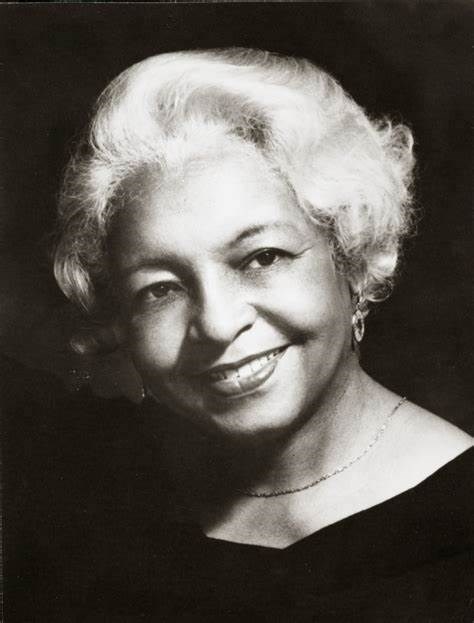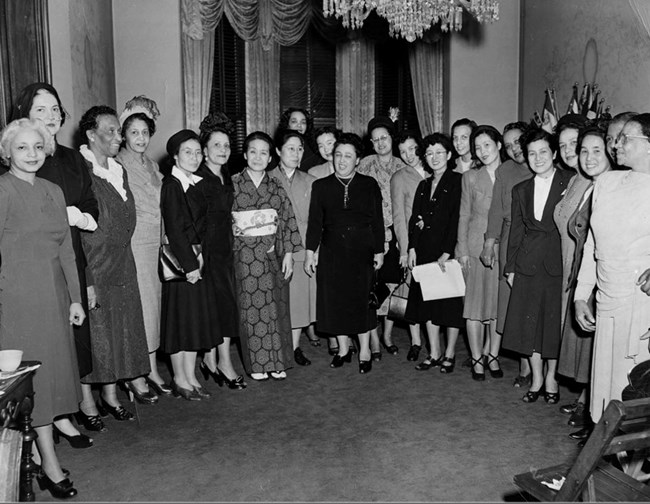
Archival Collection of Talks on Various Bahá'í Subjects Using Your PowerIn 1935, Mary McLeod Bethune harnessed the collective brilliance and power of Black women and their organizations and established the National Council of Negro Women, Inc. (NCNW) and helped to redefine the demographics of the American landscape. One such woman who found herself in Mrs. Bethune's orbit was H. Elsie Austin—an attorney, civil rights leader, and diplomat, who, like the NCNW founder, was determined to make a difference, always standing up for what was right.Early LifeHelen Elsie Austin was born May 10, 1908 in Tuskegee, Alabama. Her parents both taught at the Tuskegee Institute (now University), and encouraged their children to work for the betterment of African Americans. Growing up, Austin strived to excel in her education, but also faced racist pushback and incidents at the schools she attended. Despite this, she perservered and attended the University of Cincinnati in 1928. Still, she faced harsh realities of attending a white-led institution, recalling how her access to campus was limited compared to white students, and how she and other Black students were told by faculty to remain inconspicuous and lower their expectations for their prospects. Austin earned her B.A. and law degree from the University of Cincinnati, becoming the first Black woman to do so. Austin expressed mounting frustration with segregation forced on her by various religions. Her father pointed her to the Baháʼí Faith that teaches the values of all religions and peoples. She would remain a part of the Bahá’í Faith for the remainder of her life.
NPS, NABWH A Woman of FirstsIn 1937, Austin became the first Black female Assistant Attorney General of the state of Ohio. After two years, she moved to the nation's capital to further her legal career, working with the federal and D.C. governments as a legal advisor. In 1939, she was elected the eighth international president of Delta Sigma Theta Sorority, Inc. Beginning in the early 1940s, she met Mrs. Bethune and became affiliated with the NCNW, eventually becoming the executive director of the organization, working alongside it for many years in various leadership roles. When the NCNW dedicated the Council House on October 15, 1944, she was on-hand to represent Black women all over the country and throughout the world, saying: "I am all women in whose veins flows the blood of Black men. From my lineage have come prophets and kings, artists and scientists, educators and workers, who have given their contributions to all men and all nations. Great love has made me know the power of the heart—has kept me free from hatred and coldness. With it I have given help and comfort to all mankind...Great vision has forced me to struggle on to what shall bring goodness, truth, justice and unity to civilization. Let it never be said that I desired a better world only for my own people—for I have worked and served and achieved in all the continents of the world for all mankind. To this house I bring my gifts of the mind and spirit that it may find hope, light and guidance to what shall make a nobler world."
Her commitment to civil and federal organizations made her an inspiration as it related to civil and human rights, decades before it became popular. In 1961, she was hired to be a cultural attaché to the United States Information Agency. With this appointment, she primarily worked in Africa, also working as a US Foregin Service Officer. As a respected legal expert, she used her skills to advocate on behalf of civil rights and continued travelling all over the world, building bridges and forging alliances with people. During her travels, she lived and experienced a plethora of cultures and learned many different languages, including becoming fluent in Japanese. A woman who wore many hats, she was also a sought after speaker, contributing author, and was the recipient of numerous awards and honorary degrees. She died on October 26, 2004 at the age of 96. H. Elsie Austin should be remembered as one of many Black women trailblazers, thinkers, organizers, scholars, and writers who possessed a vision for a more just America and a more inclusive world.
|
Last updated: March 13, 2025
